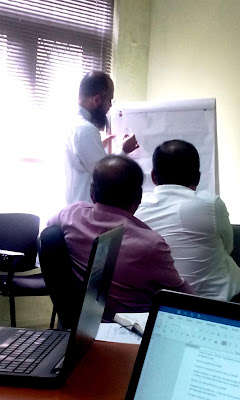Asian
Preparedness Partnership (APP) was launched in 2017 as a joint initiative of
government, private sector and civil society networks from six countries
namely, Cambodia, Myanmar, Philippines, Nepal, Sri Lanka and Pakistan, while
ADPC serves as the secretariat. The APP supports the regional, national and
local partnerships to prepare for, respond to and recover from disasters by
strengthening the leadership capacity of the governments, the private sector
and civil society organizations while
promoting south-south learning, knowledge exchange and partnerships across and
beyond the regions. The Sri Lanka Preparedness Partnership (SLPP) has been formed under the purview of Asian
Preparedness Partnership (APP) for preparedness for emergency response. The
program will help in improving the inter-organizational
coordination by engaging the Local Humanitarian Organizations and Institutions
to have increased dialogue with the National Governments and Inter-Agency
Networks through partnerships, exchange of information and knowledge resources,
training, and networking opportunities.
 |
| Mr. A. M. Sanoon from Dialog Axiata explaining the factors to be considered in BCM |
The specific
objective of the discussion was to formulate a resource group to design, plan
and conduct the proposed series of training programmes under the SLPP. The
selected resource group cum trainers has been specifically
trained to serve the purpose under the Training of Trainers (TOT) programme
which was held in July 2018. The Sri
Lanka Preparedness Partnership (SLPP) in collaboration with the Asian Disaster
Preparedness Center (ADPC), the Ceylon Chamber of Commerce and government of
Sri Lanka (Ministry of Irrigation & Water Resource Management and Ministry
of Disaster Management) with the support of Bill & Melinda Gates Foundation
(BMGF), organized this TOT on Business Continuity Management (BCM) in Colombo,
Sri Lanka. The TOT was designed to promote awareness and knowledge of the
benefits and key processes of BCM as part of overall efforts for building
business resilience. The training aimed to equip the participants to deliver
BCM training for micro, small and medium sized
enterprises (MSMEs) especially as part of enhancing their value chain and/or corporate social responsibility and
environmental sustainability programs.
After a
successful discuss the team was able to draft the outline of the training
programme, detailed out the content and identified the resource person to
conduct the specific training sessions. The tentative timeline was agreed to conduct the training programme and hopefully
the first training programme will be able to conduct
by mid December 2018.
The Sri
Lanka Preparedness Partnership (SLPP) believes that this series of training
programmes will help MSMEs to better prepare for any business disruptions
arising from natural and man-made hazards
and for effective respond and recovery.
The lessons and experiences generated through the series of BCM programme will be shared across Asia and the globe.


